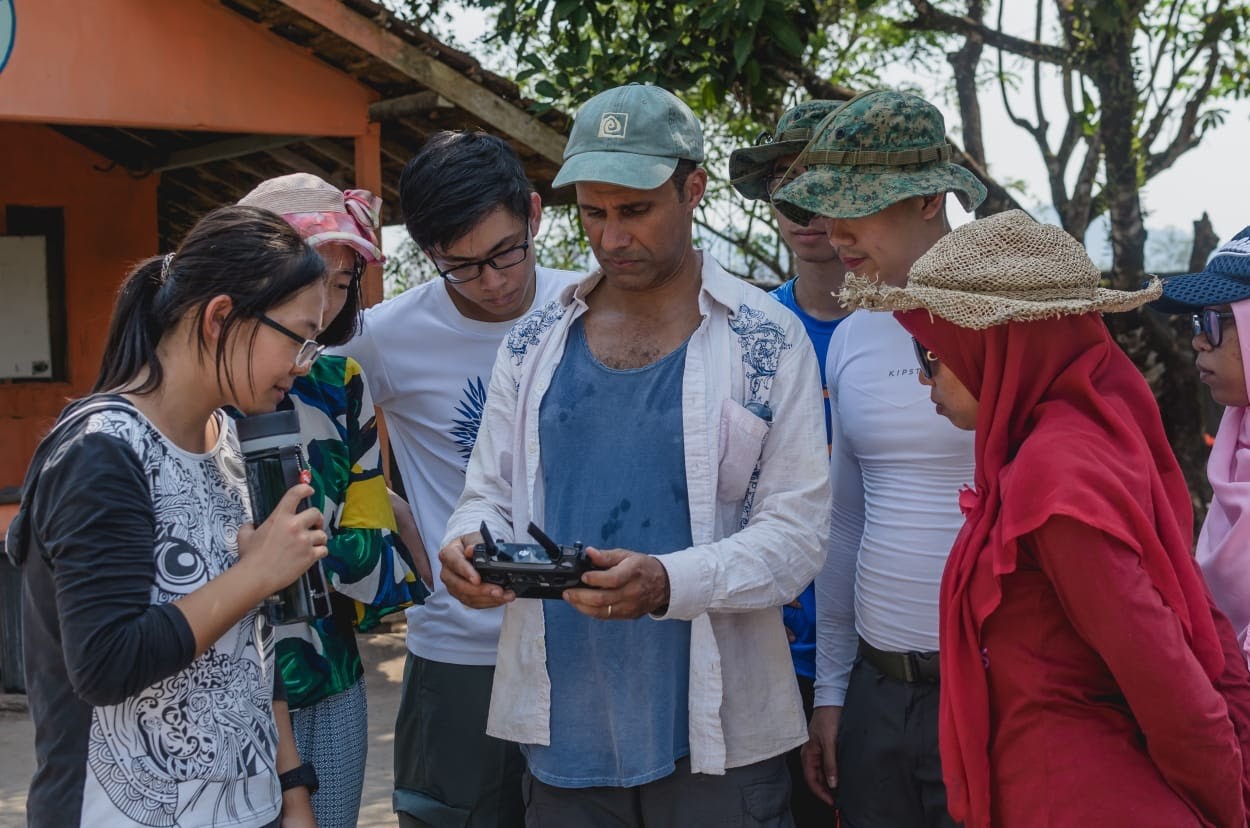Yale-NUS professors adapt teaching strategies to engage students during COVID-19
 Professor Brian McAdoo at an experiential learning trip in Indonesia. Image provided by Prof McAdoo and taken before the COVID-19 pandemic.
Professor Brian McAdoo at an experiential learning trip in Indonesia. Image provided by Prof McAdoo and taken before the COVID-19 pandemic.
The COVID-19 health crisis has impacted university education around the world, resulting in remote learning and social distancing becoming a new normal. To continue Yale-NUS College’s unique pedagogy, which prioritises experiential learning as well as the open sharing of ideas, Yale-NUS faculty have been tapping on resources offered by the Centre of Learning & teaching (CTL), brainstorming with each other and leveraging on the support from the administration to adapt their teaching for a post-pandemic world.
Since last semester, the CTL has been organising workshops and informal sessions for faculty to share strategies for effective teaching. For example, the CTL organised informal sharing sessions for faculty to discuss their ideas and plans as well as curated resources on topics such as promoting community, improving communication, and engaging students virtually.
Dr Catherine Sanger, Director of the CTL and Senior Lecturer of Social Sciences (Global Affairs), hopes that these initiatives will help faculty adapt to online teaching since some students may not be able to physically participate in classes next semester.
She said, “While transitioning to distance teaching is daunting for faculty who have always taught unmasked and face-to-face, I have been inspired by the dedication that faculty have to deliver the richness and intellectual intimacy of a Yale-NUS education in a new and evolving context. Moving forward, the CTL’s focus will be to think even more holistically about what it means for our faculty and our students to be engaging in distance teaching and learning”.
Dr Sanger also explained that inclusivity and equity are core priorities of the College. To continue harnessing the full potential of our diverse classrooms, the CTL has been working on understanding and supporting the needs of learners of all nationalities, economic backgrounds, and abilities in this new distanced context, by working with faculty to develop more inclusive online spaces.
Dr Carissa Foo, Lecturer of Humanities (Writing and Literature), appreciated the informal sharing sessions organised by the CTL as they enabled her to share ideas with other faculty on building an online community. She also benefited from learning about netiquette which helped her to set rules for her online classes so students could understand ways of socialising and communicating effectively.
Dr Foo explained that when safe distancing measures were put in place last semester, a challenge for both students and faculty was effective communication on a virtual platform. She shared, “After remote learning was implemented, I noticed that some students did not adapt as well and were speaking up less, which made for a less engaging classroom. Perhaps this was due to the online medium, but I strongly believe in the value of community in enhancing the sharing of ideas and learning and to do so, I have been thinking about how I can foster community virtually.”
Next semester, Dr Foo plans to teach a literature elective on “narratives of friendship”. In planning for the module, she has been reading about ways to build communities online as well as thinking about how she can adapt group work and presentations to extend friendship and community beyond physical presence in her class. She has also been exploring ways she can diversify teaching methods to cater to students who access knowledge differently.
Dr Foo said, “We are used to seeing someone in person, coming to class earlier or staying behind for quick chats, and these serendipitous moments are more difficult to come by when the class is moved to an online platform. Still I am hopeful that despite everything we will find creative ways to make connections with each other not just for learning but also for our humanity.
Professor of Science (Environmental Studies and Geophysics) Brian McAdoo has been working on ways to improve project-based learning in this new distance learning context. Prof McAdoo shared that he has been experimenting with project-based education to allow his students to gain practical research experience while contributing to environmental work around the world, though COVID-19 has restricted his ability to organise excursions and fieldwork.
Prof McAdoo shared that as he is planning to teach a module on planetary health next semester, he is working on ways to enhance teamwork skills for those not based in the same physical location. For example, he plans to assign projects to teams of students to encourage them to work and learn together, adapting to what may become a “new normal”. He is also planning to contact more experts from around the region to share their expertise with his students over virtual coffee chats.
He said, “Though I believe in the value of learning in the field, COVID-19 has created a lot of uncertainty around travel. I am thinking of ways for students to be able to conduct environmental fieldwork whether one is based in a country elsewhere or socially distancing in Singapore. For example, students can self-organise learning trips to local farms and environmental organisations or conduct biodiversity surveys outside of their homes. They can study the links between the environment and human health in whichever city they are based in, sharing the similarities and differences with the class. Through these initiatives, I hope that students will still be excited to learn about planetary health and gain practical fieldwork experience even if they cannot attend classes in person.”
Prof McAdoo also shared that he was concerned about being more empathic to his fellow faculty and students during COVID-19. He explained that the health crisis has expounded existing inequalities, and he hopes that his students will be able to thrive by being more compassionate and aware of their mental health and needs.





